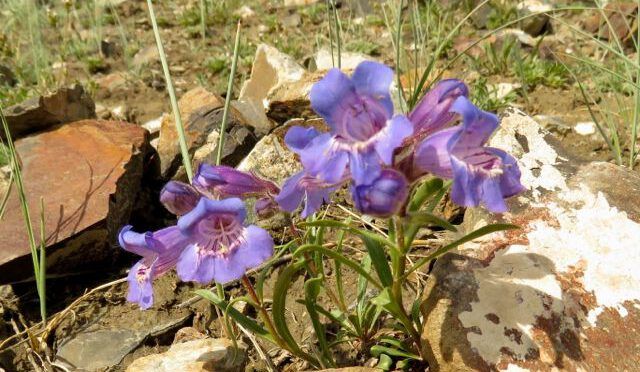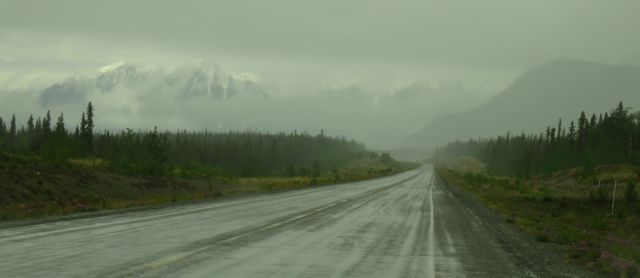 I covered comparatively little ground over the next four days, spending the time within the boundary and vicinity of the Kluane National Park. The weather was appalling but I managed to squeeze in several hikes.
I covered comparatively little ground over the next four days, spending the time within the boundary and vicinity of the Kluane National Park. The weather was appalling but I managed to squeeze in several hikes.  The hub of the Kluane Park area is Haines Junction. Roads run both north and south to Alaska. I called at the impressive interpretive centre and was given a bit of info (later I found I should have gone to the Parks department rather than the main desk, but even though I stressed that I was interested in plants, the desk guy was not all that helpful.)
The hub of the Kluane Park area is Haines Junction. Roads run both north and south to Alaska. I called at the impressive interpretive centre and was given a bit of info (later I found I should have gone to the Parks department rather than the main desk, but even though I stressed that I was interested in plants, the desk guy was not all that helpful.)
The forecast looked pretty bad, but the weather seemed slightly clearer in the north, so I headed to Kluane Lake.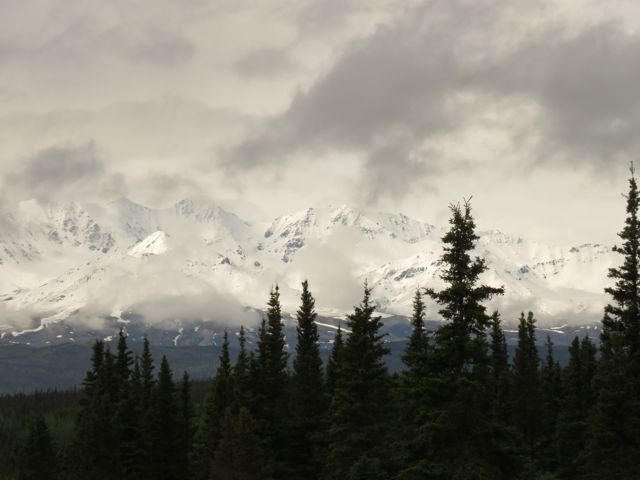 A smaller interpretive centre there was helpful (the buildings on the middle right.)
A smaller interpretive centre there was helpful (the buildings on the middle right.)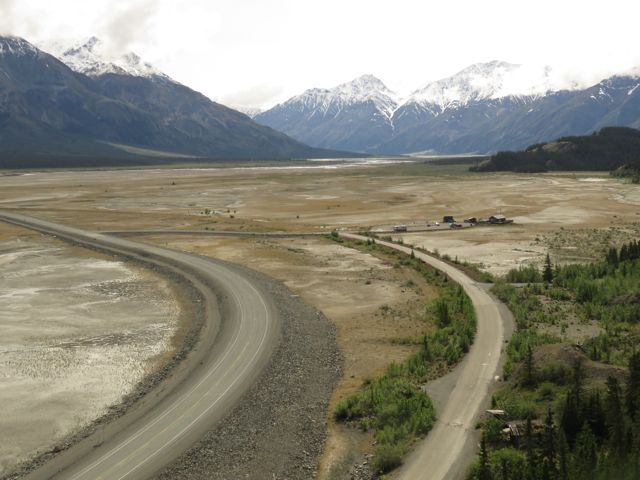 and soon I was on the dry hillsides above it. This is a favourite habitat for dall sheep but it’s hard to imagine what they live on.
and soon I was on the dry hillsides above it. This is a favourite habitat for dall sheep but it’s hard to imagine what they live on.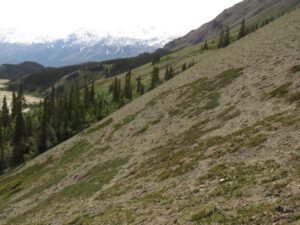 The showiest plant was the magnificent Yukon penstemon.
The showiest plant was the magnificent Yukon penstemon.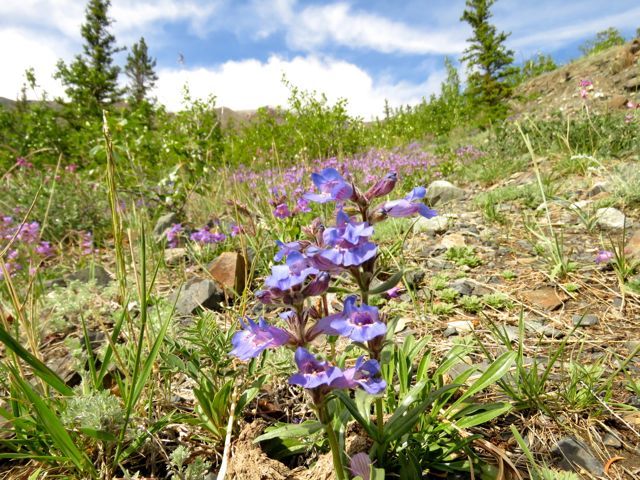
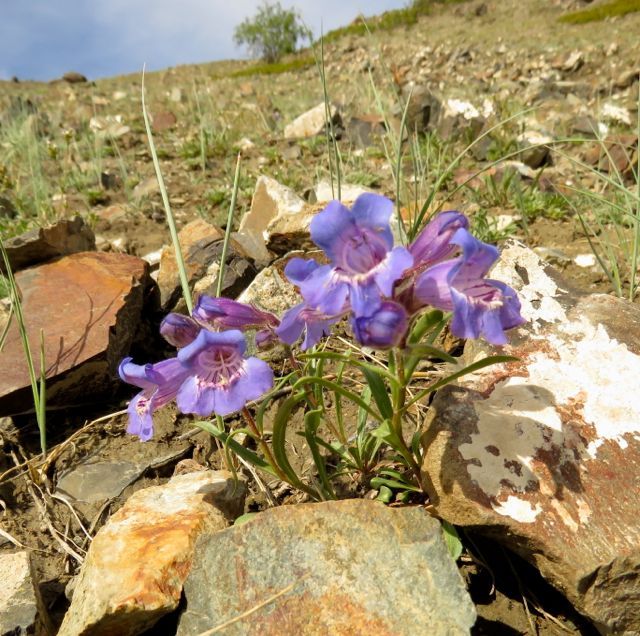 The lake used to be 2 metres deeper, but a glacier blew out and the water changed course.
The lake used to be 2 metres deeper, but a glacier blew out and the water changed course.
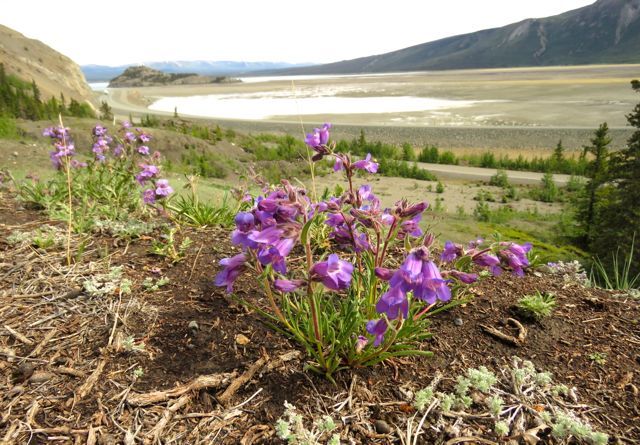 The area was too open and busy to find a good place to pull off and camp, and I headed back to Haines Junction – and the rain.
The area was too open and busy to find a good place to pull off and camp, and I headed back to Haines Junction – and the rain.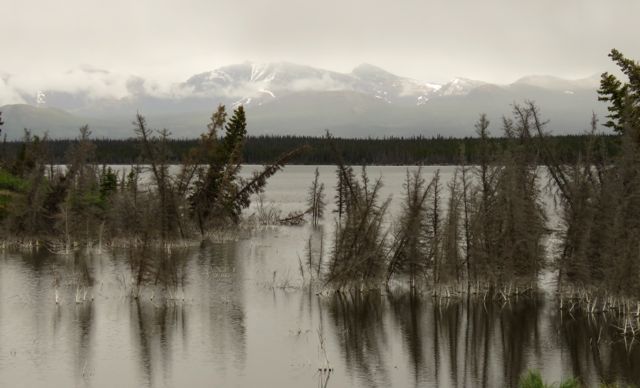 Because of the forecast, I decided to splurge on a room in the Stardust Motel.
Because of the forecast, I decided to splurge on a room in the Stardust Motel. Awful name and nothing fancy, but very clean, and the chatty owner said there would be no problem with me cooking on the porch. She could not accommodate me the following night, though, as it was the eve of the 25th Haines Junction to Haines Alaska bike race. 1300 riders from all over north America would be attending. However, if I could find nowhere else I was welcome to park in her yard, which I thought was very kind of her.
Awful name and nothing fancy, but very clean, and the chatty owner said there would be no problem with me cooking on the porch. She could not accommodate me the following night, though, as it was the eve of the 25th Haines Junction to Haines Alaska bike race. 1300 riders from all over north America would be attending. However, if I could find nowhere else I was welcome to park in her yard, which I thought was very kind of her.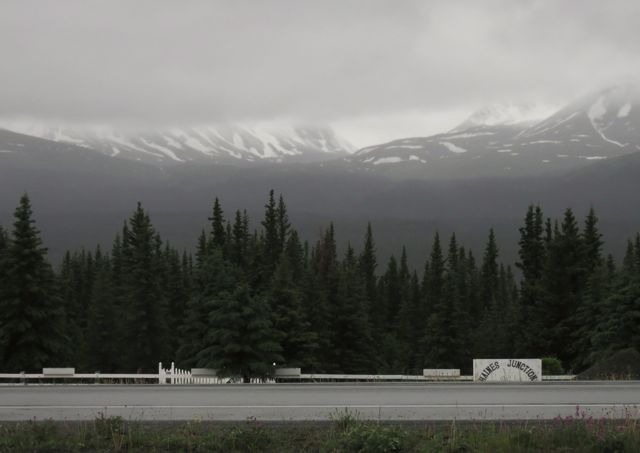 I felt very smug listening to the rain pouring down all night. I hung on late in the morning, checking email and downloading photos for the first time on the trip, but had to leave at checkout time. The rain had eased off a bit and I drove south to the Rock Glacier trail. The desk guy at the interpretive centre insisted the rocks moved “just like ice” but other info says that ice underlay the rocks causing them to move, which makes a lot more sense.
I felt very smug listening to the rain pouring down all night. I hung on late in the morning, checking email and downloading photos for the first time on the trip, but had to leave at checkout time. The rain had eased off a bit and I drove south to the Rock Glacier trail. The desk guy at the interpretive centre insisted the rocks moved “just like ice” but other info says that ice underlay the rocks causing them to move, which makes a lot more sense.
The beginning of the trail was a boardwalk through a delightful little bog. Northern green orchid.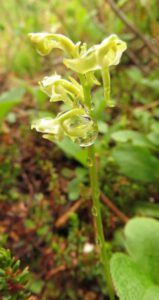
Sudetan lousewort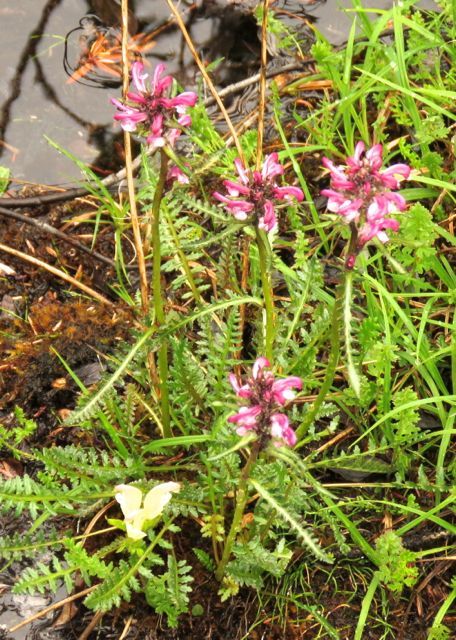 And at their feet, the Capitate Lousewort.
And at their feet, the Capitate Lousewort.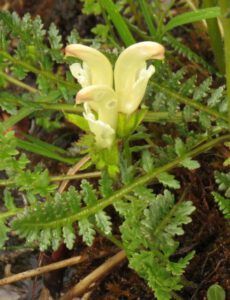 Just before the trail emerged from the forest, I came upon a Pyrola I had never seen before, only read about, Pyrola grandiflora.
Just before the trail emerged from the forest, I came upon a Pyrola I had never seen before, only read about, Pyrola grandiflora.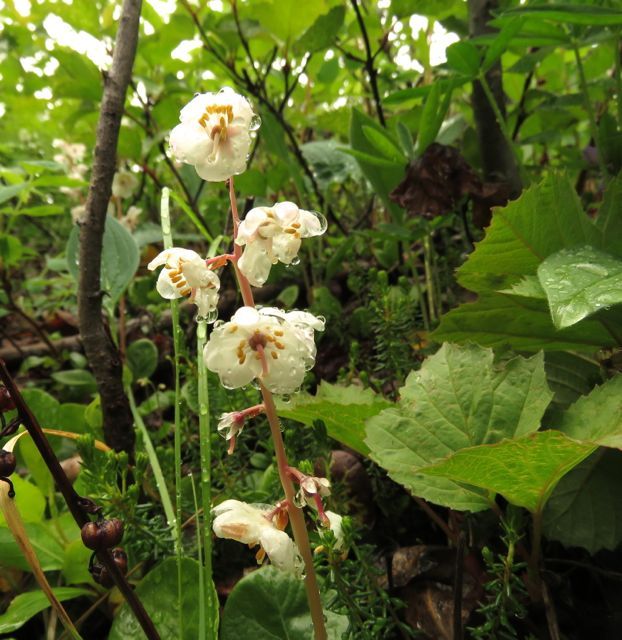 One comes out of the forest abruptly. The rocks look barren at first, but they are layered with bands of vegetation.
One comes out of the forest abruptly. The rocks look barren at first, but they are layered with bands of vegetation.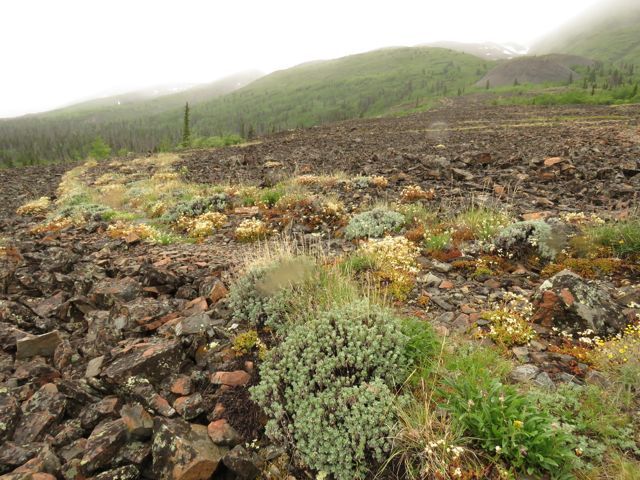 These little gardens were amazing. Saxifraga tricuspidata in the foreground, yellow alpine goldenrod, various artimesia species, two species of daisy, and so on.
These little gardens were amazing. Saxifraga tricuspidata in the foreground, yellow alpine goldenrod, various artimesia species, two species of daisy, and so on.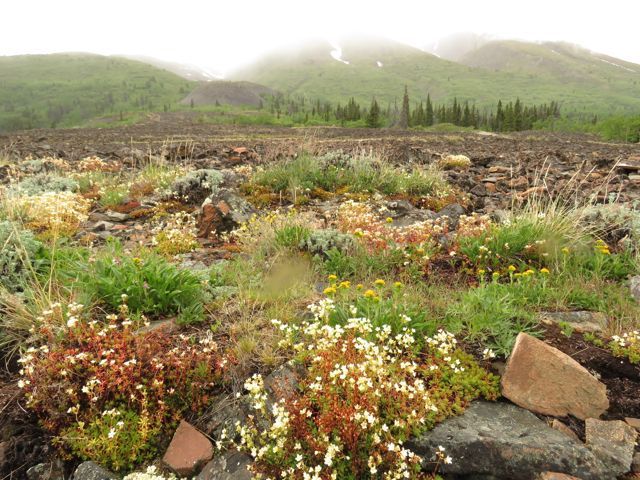 Wild roses grew there.
Wild roses grew there.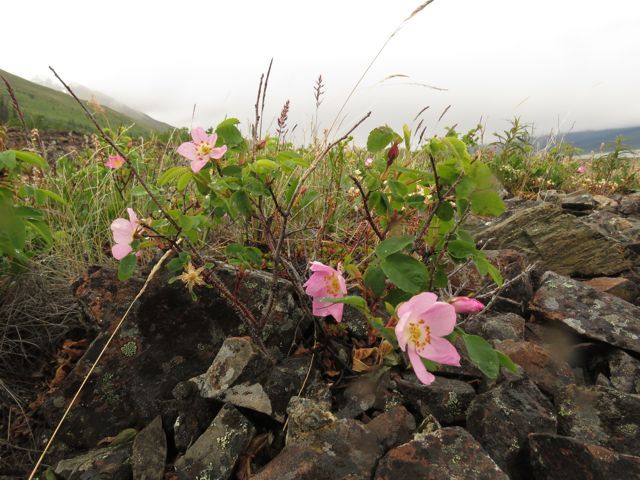 And even a clump of alpine arnica (which was very common along the roadsides.)
And even a clump of alpine arnica (which was very common along the roadsides.) 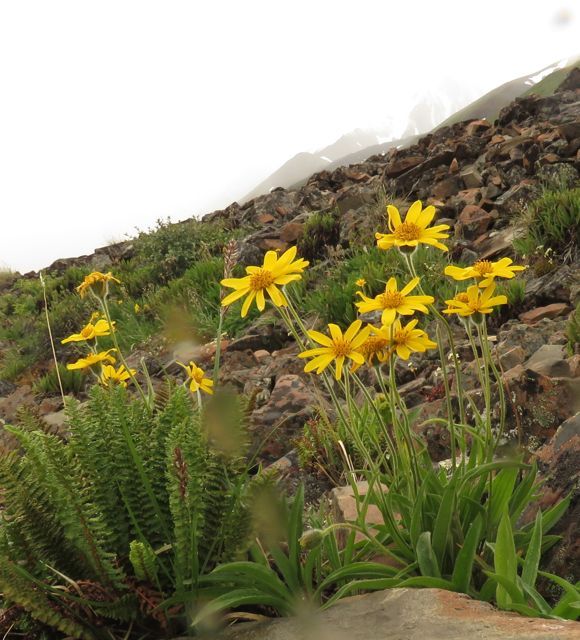 How this spruce managed to get a toehold was a mystery.
How this spruce managed to get a toehold was a mystery.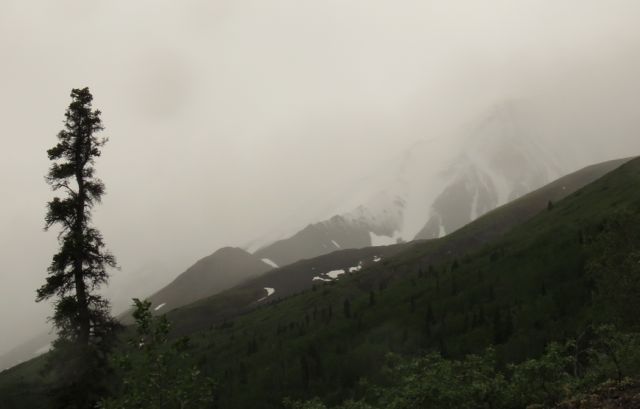 The wind was cold up there. If I was going to sleep in my van I couldn’t afford to get seriously wet, and when the rain increased, I headed back down. I tried to access another hike, but the approach road needed a vehicle with better clearance than mine. However, in looking for it, I found a quiet area to camp. I spent the next 12 hours in my sleeping bag while the rain pounded down.
The wind was cold up there. If I was going to sleep in my van I couldn’t afford to get seriously wet, and when the rain increased, I headed back down. I tried to access another hike, but the approach road needed a vehicle with better clearance than mine. However, in looking for it, I found a quiet area to camp. I spent the next 12 hours in my sleeping bag while the rain pounded down.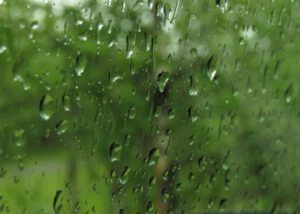 And in the morning, it had turned to snow. (This was June 17th.)
And in the morning, it had turned to snow. (This was June 17th.)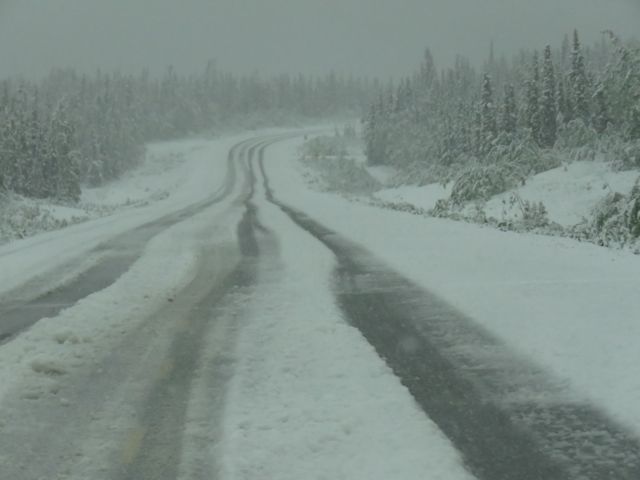 I couldn’t cook in this – maybe I could find something to eat in a restaurant in town (with food sensitivities, this is not easy.) When I arrived it was to find the restaurants jammed full – the much anticipated bike race had been cancelled.
I couldn’t cook in this – maybe I could find something to eat in a restaurant in town (with food sensitivities, this is not easy.) When I arrived it was to find the restaurants jammed full – the much anticipated bike race had been cancelled.
Not much I could comfortably do, so I decided to hang about at the interpretive centre. A plant lady (Joanne) with whom I’d been talking quite a bit, suggested that, as “I had my nose to the ground” I might enjoy the Alsek trail. This was north of town, and whereas it did not climb particularly high, it went through some wide open meadows. The weather even cleared a little, and I ended up having a very pleasant day.
At first, the plants were weighted with rain. Common blue flax. 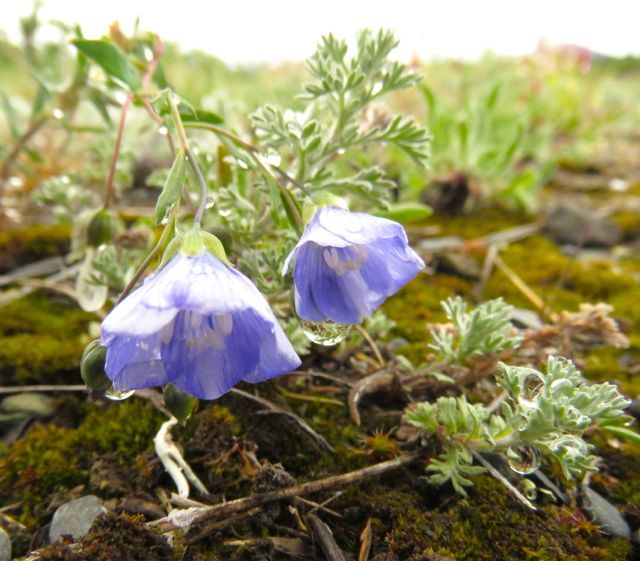 Blue columbine (the red ones of BC had disappeared.)
Blue columbine (the red ones of BC had disappeared.)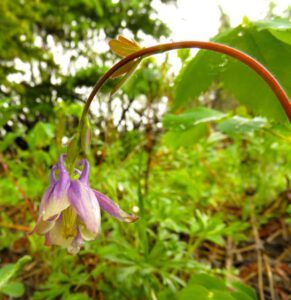 A soggy-looking horned dandelions (a wild species.)
A soggy-looking horned dandelions (a wild species.)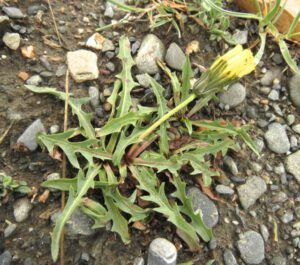 And a completely drenched butterfly.
And a completely drenched butterfly.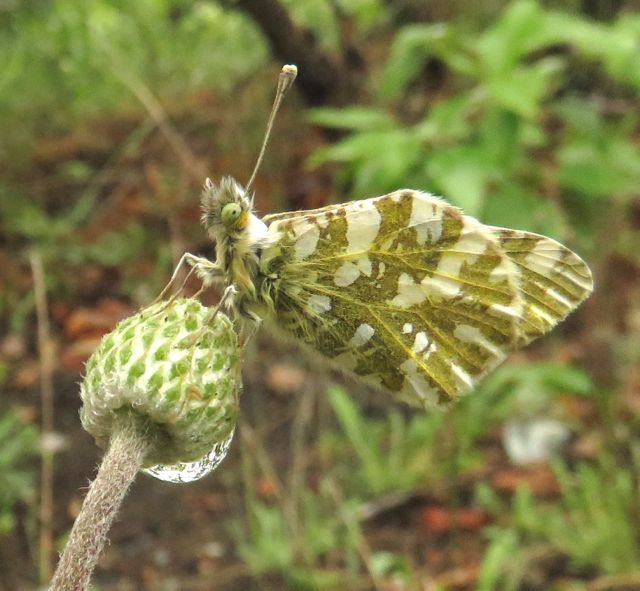 As always, the hedysarum was worthy of a picture.
As always, the hedysarum was worthy of a picture.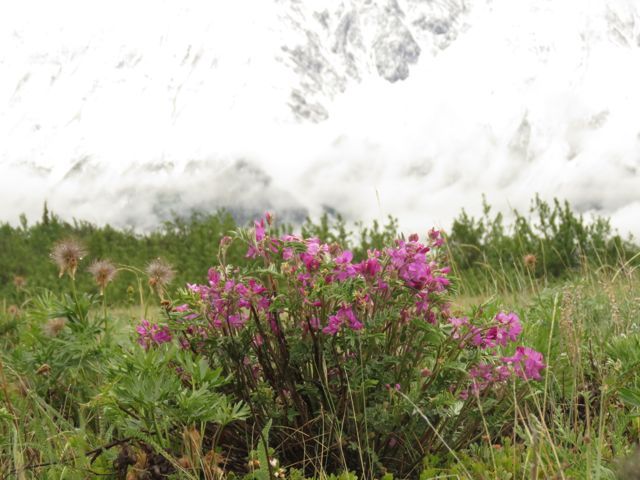 Then I started to find more interesting species. A yellow paintbrush.
Then I started to find more interesting species. A yellow paintbrush.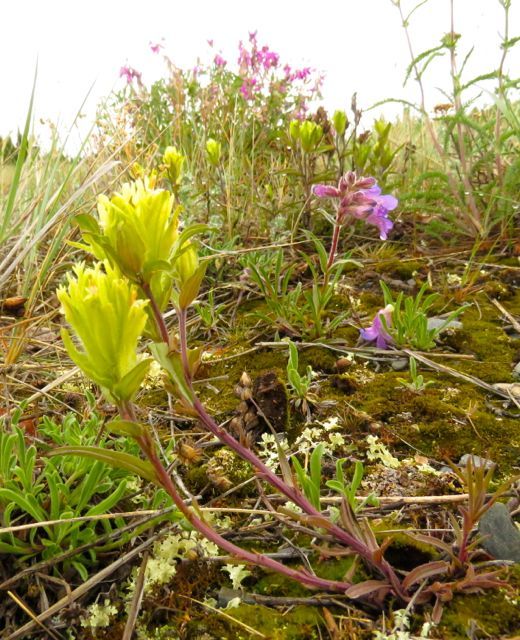 More Yukon penstemon (did I say how much I love this plant?)
More Yukon penstemon (did I say how much I love this plant?)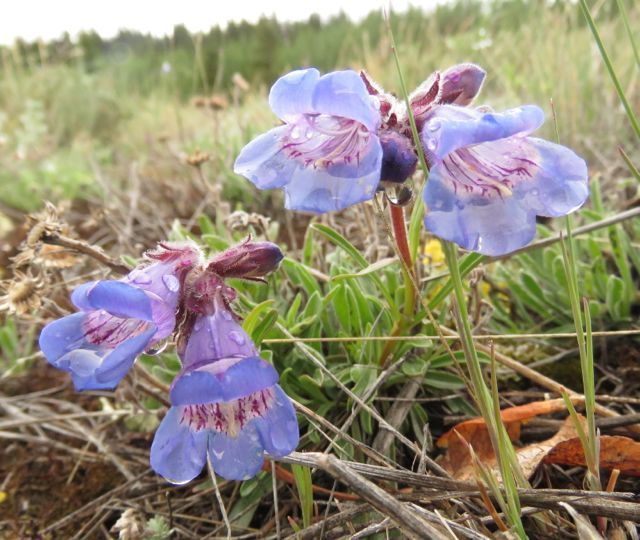 And a pea that I could not find in guide books, nor which could be identified by anyone I talked to, but now that I am home with access to more technical volumes, I’m pretty sure it’s Astragalus linearis. Its pods are hanging in the background. These were the only plants that I found.
And a pea that I could not find in guide books, nor which could be identified by anyone I talked to, but now that I am home with access to more technical volumes, I’m pretty sure it’s Astragalus linearis. Its pods are hanging in the background. These were the only plants that I found.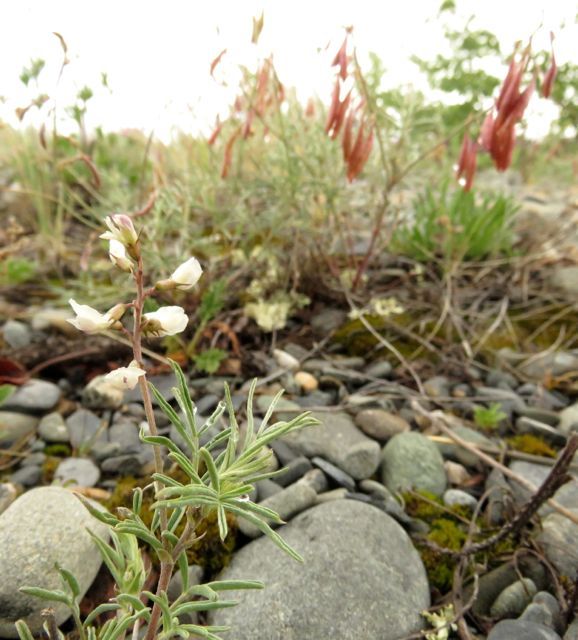 A few kilometres along the trail, great gravel fans spread over the country and the plants changed. Here is one of the very few mountain fireweeds that I found – at home they are in their billions.
A few kilometres along the trail, great gravel fans spread over the country and the plants changed. Here is one of the very few mountain fireweeds that I found – at home they are in their billions.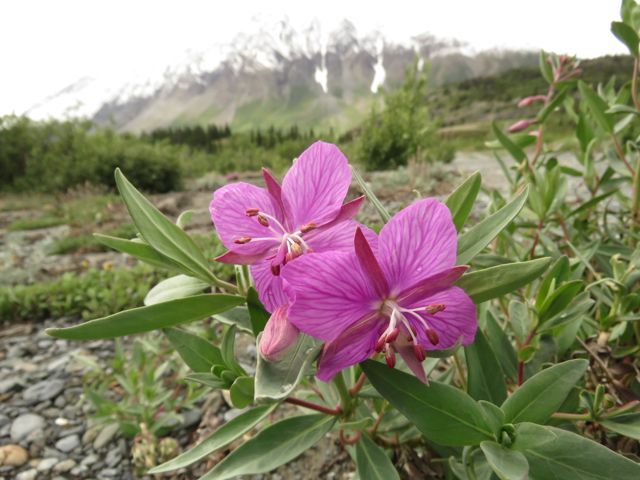 Another blue columbine looked much happier as the day improved,
Another blue columbine looked much happier as the day improved,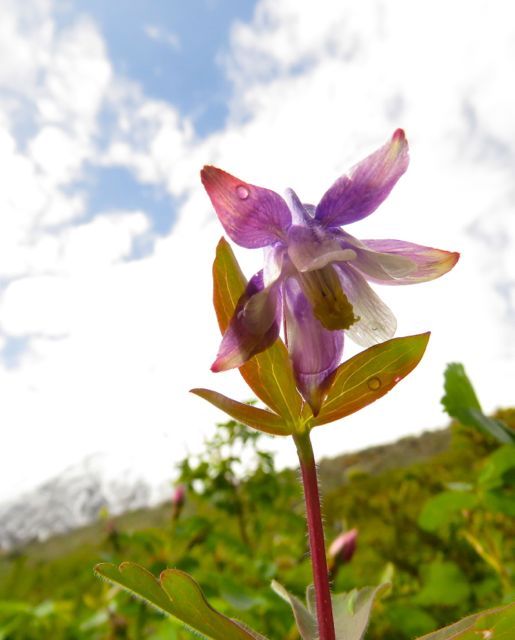 And a final treat was a few plants of the black-tipped groundsel.
And a final treat was a few plants of the black-tipped groundsel.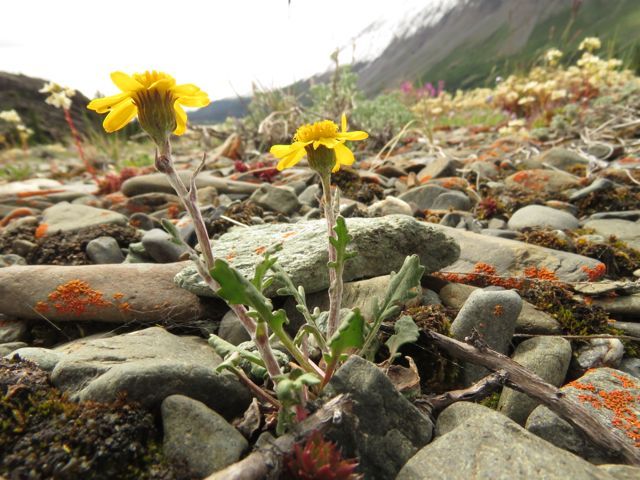 Coming back the wild dandelions and the flax had perked right up.
Coming back the wild dandelions and the flax had perked right up.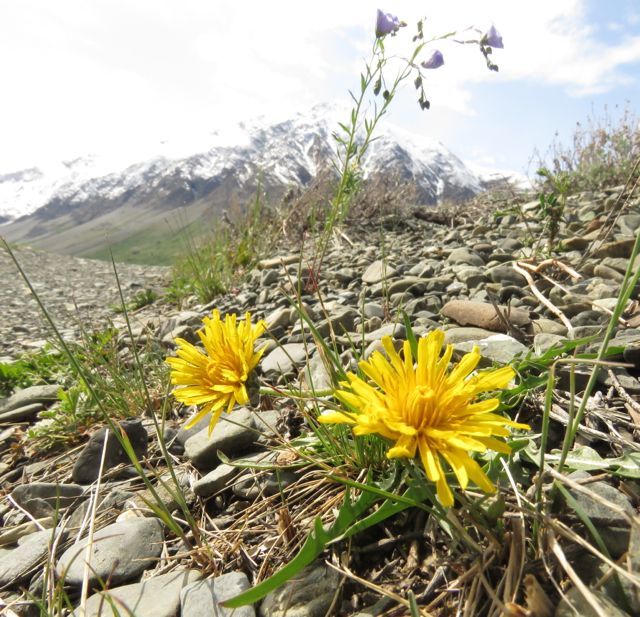 And all of a sudden, there appeared mountains that I did not know existed.
And all of a sudden, there appeared mountains that I did not know existed.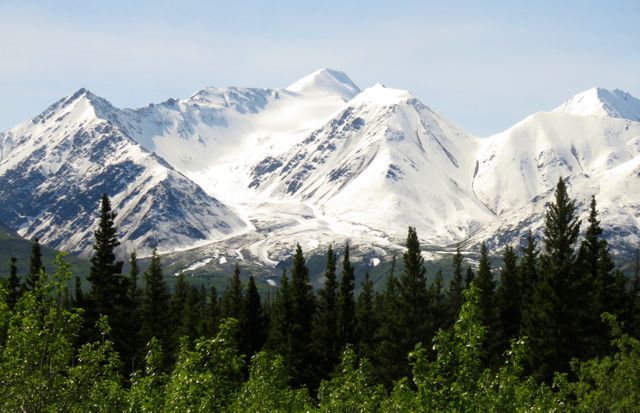 Back in Haines Junction, the snow had gone from the road, but a snowman was still recognizable.
Back in Haines Junction, the snow had gone from the road, but a snowman was still recognizable. 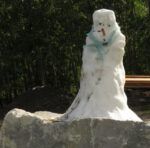 I decided to splurge on the motel again that night. The view from it in the morning was a decided improvement.
I decided to splurge on the motel again that night. The view from it in the morning was a decided improvement.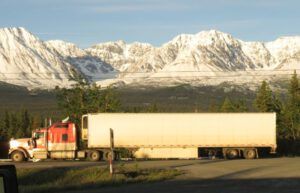 And the sunrise was pink!
And the sunrise was pink!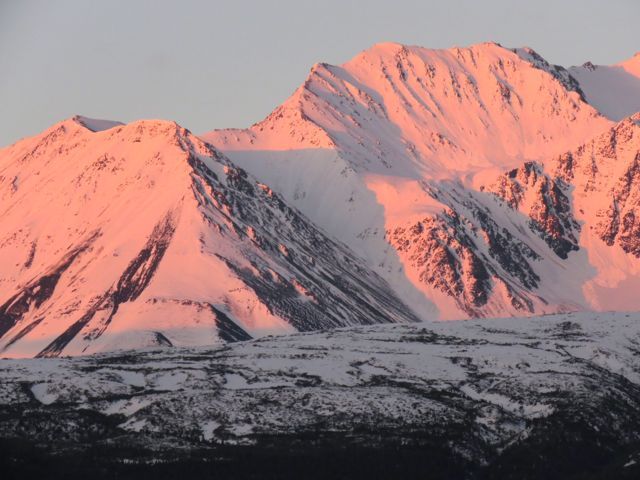
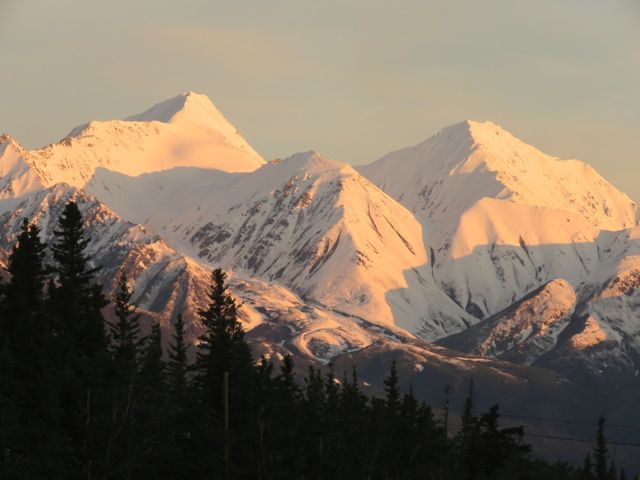 This is the third of 8 Yukon Journey posts. I screwed up when loading them. To access #4, press the left-had arrow saying “previous.”
This is the third of 8 Yukon Journey posts. I screwed up when loading them. To access #4, press the left-had arrow saying “previous.”

